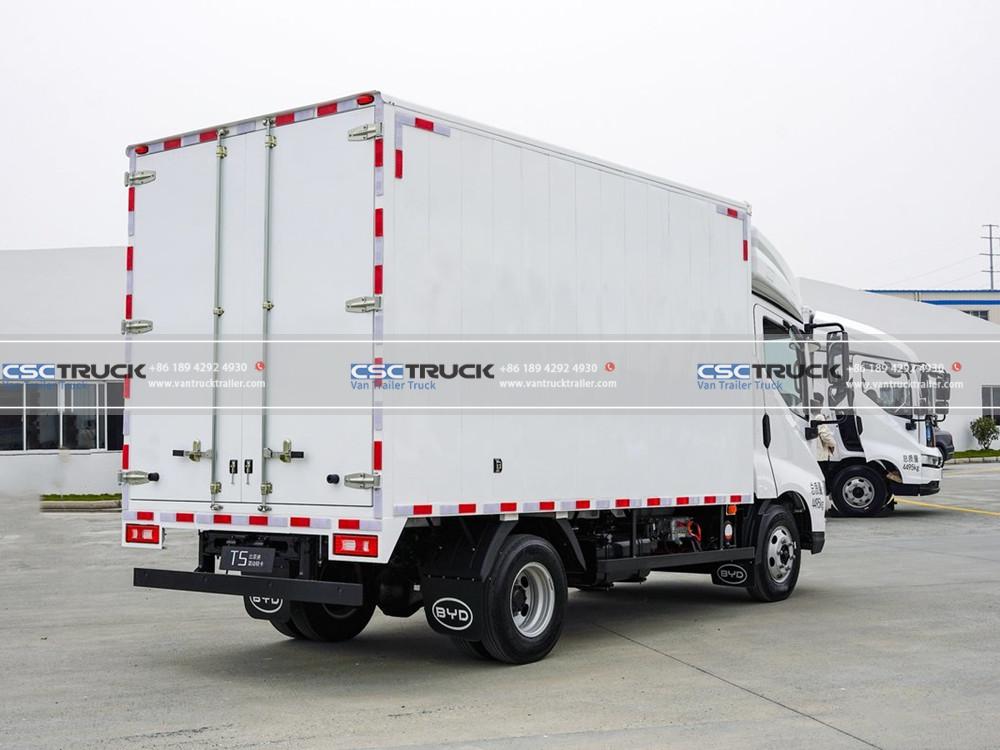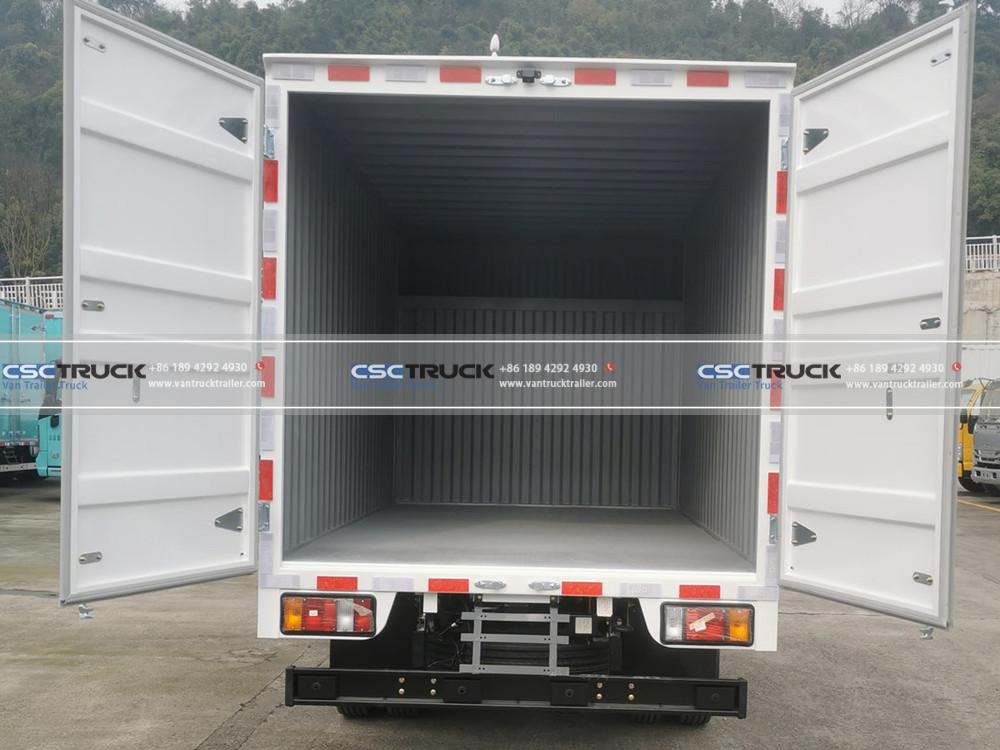In the world of logistics and freight transportation, the safe and secure delivery of goods is paramount. One of the most common and reliable solutions for long-distance shipping is the dry van truck. These trucks are designed to offer both flexibility and protection for goods being transported over long distances, ensuring that products arrive at their destination in optimal condition. In this post, we’ll explore how dry van trucks protect goods during transit and why they are essential in maintaining the quality and integrity of the items being shipped.
1. The Structure and Design of a Dry Van Truck
The primary feature that distinguishes a dry van truck from other types of transport vehicles is its solid, enclosed structure, which offers superior protection against the elements. Unlike open trailers, which leave goods exposed to rain, wind, and other environmental factors, dry van trucks have fully enclosed, rigid walls, which create a secure and controlled environment for the cargo inside. This enclosure is vital for protecting goods, especially those that are sensitive to weather conditions, such as electronics, clothing, and food products that do not require refrigeration.
The walls of a dry van truck are typically made from high-strength steel or aluminum, both of which offer durability and resistance to external damage. This sturdy construction not only protects the cargo from weather but also from potential impacts or collisions that could damage the goods. The truck’s roof is also sealed, ensuring that water or debris cannot enter the cargo space during transit.
In addition to the structural protection, dry van trucks are designed with efficient loading and unloading mechanisms. These trucks are typically equipped with hydraulic lift gates or ramp systems, allowing for easy handling of goods, whether they are heavy, bulky, or fragile. This ease of access also reduces the risk of damage during the loading and unloading process, as goods can be carefully placed into the van without the need for heavy lifting or unnecessary handling.
2. Temperature and Humidity Control for Sensitive Cargo
Although dry van trucks do not provide refrigeration capabilities, their enclosed design offers a stable internal environment that helps maintain consistent temperature and humidity levels. For many goods, such as textiles, machinery, and books, exposure to fluctuating temperatures and humidity levels during long-distance shipping can lead to deterioration or damage. The solid structure of a dry van truck helps mitigate such risks, creating a more controlled environment for the cargo.
For businesses that need additional protection for temperature-sensitive items, there are specialized options available, such as refrigerated trucks or cargo trucks with built-in climate control. However, for most dry goods, a standard dry van truck provides sufficient protection from the outside elements. These trucks also shield against external contaminants like dust, dirt, or insects, which could compromise the quality of certain types of goods.
Many dry van trucks are also equipped with ventilation systems, ensuring that air can circulate properly within the cargo space. This circulation helps to prevent the buildup of moisture, which can lead to mold or mildew. For businesses shipping products that are particularly sensitive to moisture, such as paper products or certain electronics, this feature can significantly reduce the risk of damage.

3. Security Features to Safeguard Cargo During Transit
Another critical aspect of dry van trucks is their ability to secure cargo during long-distance transport. In the shipping industry, the security of goods is a top concern. Dry van trucks come equipped with various security features to ensure that goods are not tampered with, stolen, or damaged while in transit.
One of the most important security features of a dry van truck is its locking system. These trucks typically come with high-security locks and seals that prevent unauthorized access to the cargo space. Some modern dry van trucks are equipped with advanced security technologies such as GPS tracking systems, which allow logistics companies and clients to track the location of their goods in real time. This added layer of security provides peace of mind for businesses, knowing that their goods are being monitored throughout their journey.
In addition to secure locking systems, many dry van trucks are equipped with reinforced doors and impact-resistant walls that prevent break-ins or tampering during stops or transit. This is especially important for high-value goods, such as electronics, pharmaceuticals, or luxury items. Dry van trucks also help reduce the risk of theft because their enclosed nature makes it more difficult for would-be thieves to access the cargo.
For sensitive or valuable goods, additional measures like securing straps and pallets may be used to ensure that the cargo does not shift or become dislodged during the journey. By reducing the likelihood of movement within the truck, businesses can further minimize the risk of damage during long-distance shipping.
4. Versatility for Various Types of Goods
One of the reasons dry van trucks are so widely used in long-distance shipping is their versatility. These trucks can transport a wide range of products, from consumer goods to industrial equipment, making them ideal for a variety of industries. Whether it’s electronics, clothing, machinery, or food products that don’t require refrigeration, a dry van truck provides a reliable solution for transporting goods safely over long distances.
This versatility is complemented by the size and capacity of dry van trucks. These vehicles come in various configurations, with some offering extended lengths and higher payload capacities for larger shipments. For businesses that regularly ship bulky or oversized goods, dry van trucks can accommodate a wide range of cargo, providing flexibility and scalability for shipping needs.
In cases where goods need additional protection, dry van trucks can be fitted with custom interior layouts or padding to further safeguard sensitive items. For instance, delicate goods such as glassware, furniture, or artworks can be transported with additional protective measures, ensuring that they are kept safe and secure throughout the journey.
5. Cost-Effectiveness and Efficiency for Long-Distance Shipping
Beyond their physical protection and security features, dry van trucks are also cost-effective and efficient for businesses looking to ship goods over long distances. As one of the most widely used types of shipping vehicles, dry vans offer an economical solution for long-distance transportation. They are more affordable to maintain and operate compared to specialized vehicles like refrigerated trucks or asphalt distributor trucks, which may require additional features or temperature control systems.
Additionally, dry van trucks are typically more fuel-efficient than other, more specialized vehicles, helping to keep shipping costs down for businesses. The enclosed design of a dry van truck reduces drag, improving aerodynamics and allowing for smoother travel over long distances. This results in lower fuel consumption, ultimately benefiting both the environment and the company’s bottom line.
The efficient nature of dry van trucks also extends to the loading and unloading process. With their easy access doors and standardized dimensions, dry van trucks streamline the handling of goods, ensuring that products can be quickly loaded and unloaded. This speed not only saves time but also reduces labor costs and potential delays, making long-distance shipping more efficient and affordable.
The dry van truck is a vital asset in the logistics industry, offering a reliable, safe, and cost-effective solution for long-distance shipping. With their enclosed, durable structure, these trucks protect goods from environmental hazards, security breaches, and potential damage during transport. Their versatility, security features, and cost-efficiency make them a go-to choice for transporting a wide variety of goods, from electronics to machinery, textiles, and more. Whether you’re shipping large quantities of goods or handling sensitive materials, dry van trucks ensure that products arrive at their destination in optimal condition, with minimal risk of damage or loss.

